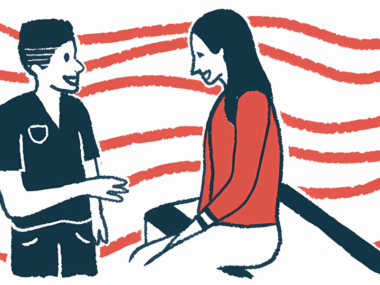Mindful Movement Can Help Motor Hesitation
Written by |

At my last presentation to a support group for Parkinson’s disease (PD), one attendee said, “My husband wobbles a lot when getting up from the sofa. I’m afraid he will fall. What can we do about that?”
I asked her husband to stand, which he did with grace. A slight hesitation accompanied motor initiation, but no severe wobbling was present. I explained how PD movement fluidity can improve in formal settings.
This information was new to the audience, but not to me. I have been told by people with PD that motor symptoms are less disabling in formal settings, such as entertaining company or presenting to a group, than in informal settings, such as sitting at home on the sofa watching TV with a partner.
Unfortunately, patients often view the doctor’s office as a formal setting. When doctors ask me to stand or sit, I perform excellently — occasionally with a little hesitation, but no serious wobbling.
Motor hesitation commonly accompanies motor initiation in formal and informal settings. Wobbling, instability, and stumbling when transitioning from sitting to walking can follow motor hesitation, particularly in everyday settings. We can use this knowledge to explore possibilities with PD, especially in the early stages of the disease.
Why does motor hesitation occur?
I have previously talked about autopilot and scenario looping. We don’t have to think about walking. Walking is an overlearned motor sequence, stored in our memory, accessed via autopilot, and tied into the scenario looping process.
People with PD experience scenario looping breakdowns and a broken autopilot. We cannot rely on our bodies to automatically and smoothly transition from sitting to walking. Broken autopilots will likely result in wobbling, instability, and stumbling — particularly in informal settings, because our minds tend to focus on other things.
We assume our body will automatically get off the sofa and walk into the kitchen without requiring anything special of us. But that is no longer the case for people with PD. Formal settings show us that our movements become less problematic when we pay extra attention to them.
Mindful movements
We need to do anything and everything we can to decrease the possibility of falling, which is a serious concern. It may seem strange, but I’ve started to “perform” my daily movements. It’s similar to practicing tai chi or dancing every time I get out of a chair, walk from the bathroom to the living room, or even leave the bed.
We can incorporate mindful movements into our lives in formal and informal situations. Mindful movements start with a pause. Before I transition to a new position, I pause, focusing on the movement of my arms, legs, and feet. My movements are slower, slightly exaggerated, and — at least in my mind — graceful.
The LVST BIG program touches on mindful movement. The incorporation of mindful movement needs to be personal, intentional, and eventually, common practice. It took me about six months of daily practice before mindful movement became a regular part of how I move in the world. However, we can tailor mindful movements to fit our lifestyles.
Mindful movement turns informal to formal. Remember that improved quality of life, not perfection, is the goal. It takes time for mindful movement to become a regular part of your routine and impact your quality of life, but it is well worth the effort.
Do you practice mindful movement? Do you notice a difference in your movements in formal situations versus informal ones? Please share in the comments below.
***
Note: Parkinson’s News Today is strictly a news and information website about the disease. It does not provide medical advice, diagnosis or treatment. This content is not intended to be a substitute for professional medical advice, diagnosis, or treatment. Always seek the advice of your physician or another qualified health provider with any questions you may have regarding a medical condition. Never disregard professional medical advice or delay in seeking it because of something you have read on this website. The opinions expressed in this column are not those of Parkinson’s News Today or its parent company, Bionews Services, and are intended to spark discussion about issues pertaining to Parkinson’s disease.






Amit Chavan
Very nice.
I never think that in too much deep.
Now I can take more heed of it.
Thanks.